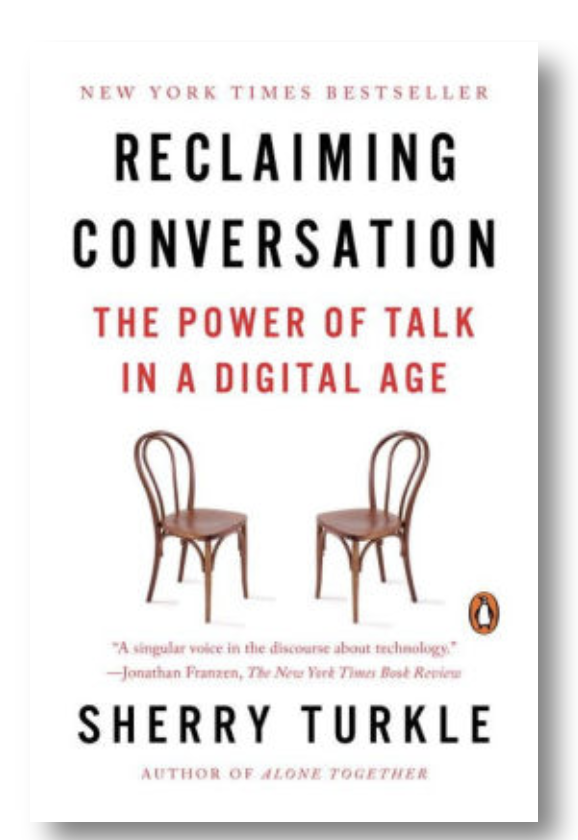Reclaiming Conversation by Sherry Turkle
Reclaiming Conversation by Sherry Turkle
 Although this book bemoans the loss of conversation because of modern technology, I don’t believe I have recently read a book that stimulated more conversation with people who are important to me than this one did. Early in the book, there is a reference to a cute two-minute video which had 51 million hits the last time I looked. It is titled “I Forgot My Phone” (https://www.youtube.com/watch?v=OINa46HeWg8). The response to this simple message reveals to me the awareness that people now have concerning their increasing dependency on their phones.
Although this book bemoans the loss of conversation because of modern technology, I don’t believe I have recently read a book that stimulated more conversation with people who are important to me than this one did. Early in the book, there is a reference to a cute two-minute video which had 51 million hits the last time I looked. It is titled “I Forgot My Phone” (https://www.youtube.com/watch?v=OINa46HeWg8). The response to this simple message reveals to me the awareness that people now have concerning their increasing dependency on their phones.
It is stating the obvious that people are on their phones much of the time, at the dinner table, while working, in school, walking in the street, riding in the car-frequently while driving, before going to sleep, just after waking up, as well as in many more places and situations. The author hammers home the point which should be obvious, but perhaps it is not, that texts, emails, emojis, etc. are taking the place of real conversations between people. Replying to a text or email while you are with people is not a real conversation with the person who is in your presence or with your phone partner. In person conversations facilitate real relationships and creativity.
The impact of this book, which is based on a good deal of personal research by the author as well as studying other peoples’ research and observations, is not simply a loss of the art of or advantages of meaningful conversation. Ms. Turkle makes a very strong argument and a scary one, as she gives numerous examples proving the point, that the more we communicate with our phones as compared to being in person, the more we lose the ability to have empathy and to be empathic with other people. The ability to relate to others and to understand their feelings is the essence of what makes us human. Ms. Turkle is making a very compelling case that modern technology is making us lose our humanity.
This point is made in the book numerous times. While it is even somewhat repetitious, there is great value to see it in so many different contexts. For example, there is a parent who takes a small child to the park and is looking at his or her phone rather than looking and talking to the child. The author gives the all familiar example of a family who is at home or in the car with children involved in games or texting as the parents are likewise preoccupied with their phones rather than the family relating to each other. When there should be an in person creative business meeting, instead the meeting is held by Skype during which the participants are multitasking in their own locations. There is a school lunch table where friends instead of talking and understanding each other, are looking at their latest texts. There are obviously numerous other examples that could be made and are made in this book.
While the results of the invasion of our phones and all that goes with it is scary and discouraging, there is hope. The author talks about families, businesses and schools that are addressing these issues with no phone zones, no phones at meals or in the car and other creative ways of bringing people together and encouraging conversation. However, it is also clear that we are far from solving this problem. In fact, the author shows us with many examples that we are regressing “Siri” to robots who we want to take care of us. Do we believe that artificial intelligent machines can understand and respond to us? Where are we going with this issue? What should we do about the effects of modern technology on our humanity and the impact on our children. Read this book and keep talking about this subject.
Please consider leaving your comments below
To purchase this book on Amazon, please click here













